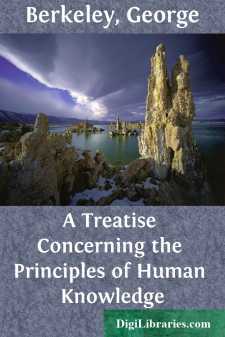Categories
- Antiques & Collectibles 13
- Architecture 36
- Art 48
- Bibles 22
- Biography & Autobiography 813
- Body, Mind & Spirit 142
- Business & Economics 28
- Children's Books 17
- Children's Fiction 14
- Computers 4
- Cooking 94
- Crafts & Hobbies 4
- Drama 346
- Education 46
- Family & Relationships 57
- Fiction 11829
- Games 19
- Gardening 17
- Health & Fitness 34
- History 1377
- House & Home 1
- Humor 147
- Juvenile Fiction 1873
- Juvenile Nonfiction 202
- Language Arts & Disciplines 88
- Law 16
- Literary Collections 686
- Literary Criticism 179
- Mathematics 13
- Medical 41
- Music 40
- Nature 179
- Non-Classifiable 1768
- Performing Arts 7
- Periodicals 1453
- Philosophy 64
- Photography 2
- Poetry 896
- Political Science 203
- Psychology 42
- Reference 154
- Religion 513
- Science 126
- Self-Help 84
- Social Science 81
- Sports & Recreation 34
- Study Aids 3
- Technology & Engineering 59
- Transportation 23
- Travel 463
- True Crime 29
George Berkeley
George Berkeley (1685-1753) was an Irish philosopher and clergyman, best known for developing the theory of immaterialism, also called subjective idealism. He argued that the physical world exists only in the perceptions of the mind, famously stating, "to be is to be perceived." Berkeley's ideas challenged the materialist philosophy of his time, influencing later philosophers such as David Hume. He also served as the Bishop of Cloyne and was involved in various educational and missionary activities in both Ireland and America.
Author's Books:
Sort by:
by:
George Berkeley
1. My design is to show the manner wherein we perceive by sight the distance, magnitude, and situation of OBJECTS. Also to consider the difference there is betwixt the IDEAS of sight and touch, and whether there be any IDEA common to both senses. 2. It is, I think, agreed by all that DISTANCE, of itself and immediately, cannot be seen. For DISTANCE being a Line directed end-wise to the eye, it projects...
more...
by:
George Berkeley
PREFACE What I here make public has, after a long and scrupulous inquiry, seemed to me evidently true and not unuseful to be known--particularly to those who are tainted with Scepticism, or want a demonstration of the existence and immateriality of God, or the natural immortality of the soul. Whether it be so or no I am content the reader should impartially examine; since I do not think myself any...
more...
by:
George Berkeley
lthough there are several excellent persons of the church of England, whose good intentions and endeavours have not been wanting to propagate the gospel in foreign parts, who have even combined into societies for that very purpose, and given great encouragement, not only for English missionaries in the West-Indies, but also, for the reformed of other nations, led by their example, to propagate...
more...
by:
George Berkeley
THE FIRST DIALOGUE PHILONOUS. Good morrow, Hylas: I did not expect to find you abroad so early. HYLAS. It is indeed something unusual; but my thoughts were so taken up with a subject I was discoursing of last night, that finding I could not sleep, I resolved to rise and take a turn in the garden. PHIL. It happened well, to let you see what innocent and agreeable pleasures you lose every morning. Can...
more...
by:
George Berkeley
Part I Query 1. Whether there ever was, is, or will be, an industrious nation poor, or an idle rich? 2. Qu. Whether a people can be called poor, where the common sort are well fed, clothed, and lodged? 3. Qu. Whether the drift and aim of every wise State should not be, to encourage industry in its members? And whether those who employ neither heads nor hands for the common benefit deserve not to be...
more...






